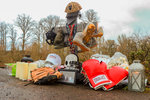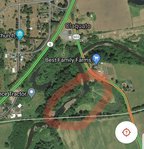





The search continues today for the body of an 18-year-old Centralia High School graduate who is believed to have drowned in Chehalis River late Tuesday afternoon.
Zach Hines-Rager and three friends were reportedly on the Willapa Hills Trail into the Chehalis River when they went onto a nearby railroad trestle bridge and Hines-Rager told his friends that he wanted to jump in — something he had done before.
“It’s not a super uncommon thing either,” said Lewis County Sheriff’s Office Deputy Dusty Breen, who added that the bridge is a popular recreation site during the warm weather months. Hines-Rager reportedly jumped in, resurfaced and had started swimming to the bank when he called out to his friends for help due to the cold temperature of the water. One of his friends got in the water and reached Hines-Rager — but also began to struggle due to the cold water. The friend safely made it back to shore, but during the swim, Hines-Rager had reportedly gone “limp” and slipped out of his friend’s grasp. He wasn’t seen again.
The Lewis County Sheriff’s Office received the call at 6:45 p.m. Tuesday evening. A search began 9 a.m. the following morning, with assistance from the Thurston County Dive Team, and continued until 6 p.m. The search resumed again at 9 a.m. this morning.
While volunteers arrived on-site to help with the search, Breen said that due to the stability of the riverbank and the temperature of the water, the bulk of the search work is being left to the dive team. The public is now being asked to stay away from the scene after the family earlier called for volunteers.
“Hopefully we’ll get a resolution here for the family soon,” he said.
Breen said it’s not uncommon for people to want to return to popular water recreation sites as soon as the sun starts to come out — but given how cold the water still is this time of year, he advised people to be cautious.
When submerged in cold water, the body begins to lose motor skills and experience the onset of hypothermia and a loss of cognitive function.
“The body starts shutting down,” said Breen. “It’s too cold to function.”